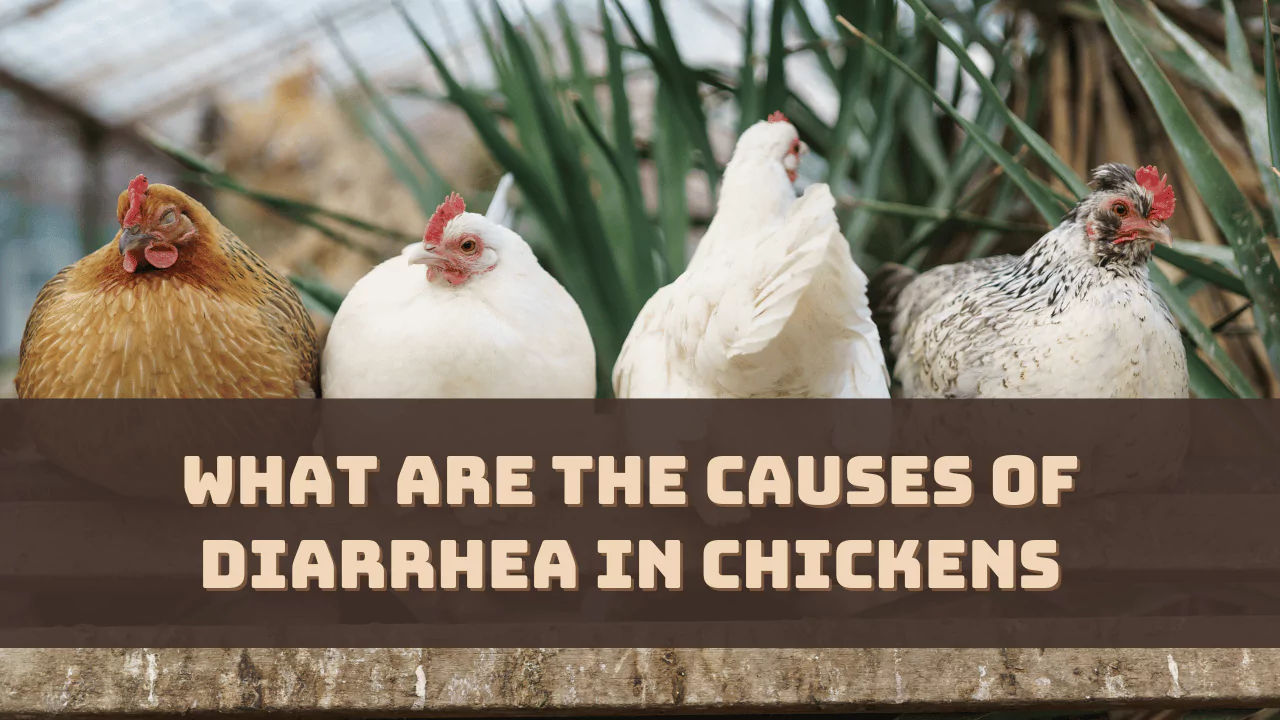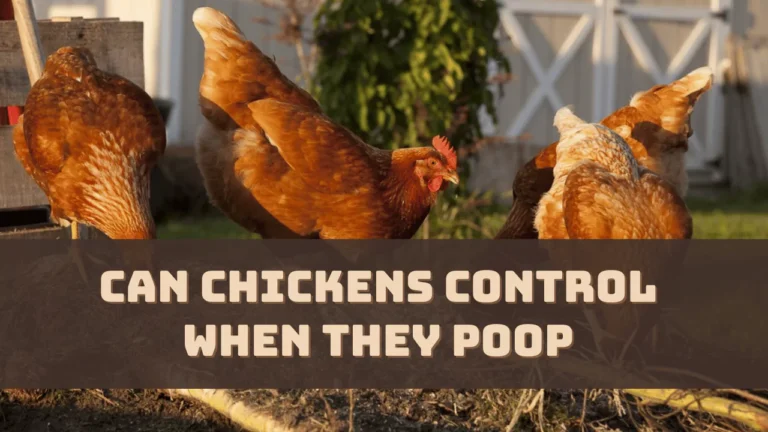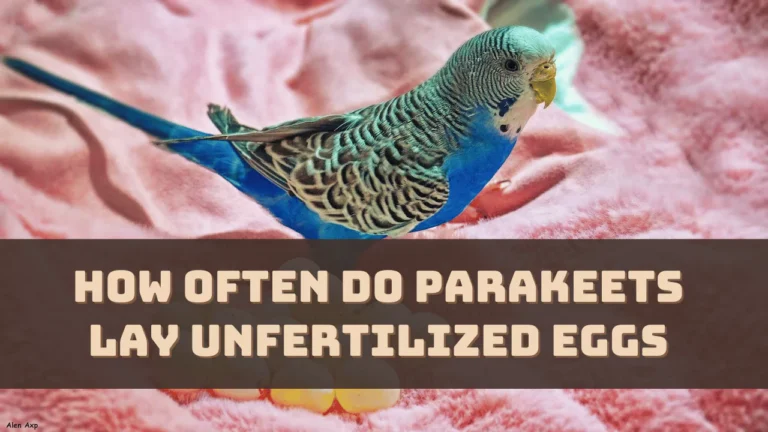A healthy chicken has brown and white capped (urate) dropping. They also excrete a foul-smelling cecal dropping which is also normal. However, in the case of diarrhea, the stool loses its consistency and looks like colored water. It has a watery texture and foul smell. Diarrhea in a chicken can occur due to several reasons, but if you are seeing them for the first time, at a bird coup, it can be quite alarming.
So, let’s get to know about the causes and the treatment process to help these birds.
How do Identify Diarrhea from the Colour of Chicken Poop?
Based on what the chickens are eating or whether they are affected by any infection or health problem the dropping color changes, such as –
- Brown – This is a normal color of chicken dropping
- Brown-colored water – This is a sign of diarrhea and is caused by to high intake of water and bacterial infection.
- Black – Either the chicken is eating too many blackberries or blueberries or there is the presence of blood in the dropping.
- Red and orange – Due to lead poisoning or coccidiosis, the intestinal lining is shed which needs immediate treatment.
- Green – If the body is eating too much veggies, then they can poop green.
- Yellow – It is a sign of eating either too many strawberries or a sign or presence of peritonitis.
- White or creamy – This is not diarrhea but rather a sign of vent gleet, which is the discharge from the cloaca vent.
What Causes Diarrhea in Chicken?
A chicken can drop cecal many times in a day, but you must not confuse it with diarrhea. These are normal and no treatment is required for this. You need to be active if diarrhea occurs, which is caused due to –
Indulgence in Excess Food
Chicken can get indulged in eating too much food or overeating which can lead to diarrhea. With supportive medications, it will stop accordingly, after 24 to 36 hours and all you have to do is ensure that a chicken gets access to fresh, clean water which has added vitamins and electrolytes.
Heat Stress
During humidity and hot days, chickens need to drink water frequently. However, if excess water is consumed along with decreased appetite, due to the heat, then it can develop into diarrhea. Treatment is quite simple, you should provide the chicken with cool, clean, fresh water with added vitamins and electrolytes. The chicken should be put in a cool room, away from the direct heat exposure. If the temperature is too high, then make the chicken stand in cold water, it will help to bring her temperature down. Also, blowing a fan at her and providing shade can help. You must encourage the chicken to eat feed mash, which can be prepared with regular field mixed with water, along with access to cold drinking water.
Antibiotic
If the chicken is suffering from any kind of infection and antibiotics are given to cure then, it can also lead to diarrhea. Antibiotics remove the good bacteria that affect the gut health. So, it is always recommended to ensure that along with antibiotics, a chicken must also get enough water, vitamins, electrolytes, and good quality feed to restore gut health. You can provide them with probiotics. However, a chicken cannot process dairy products, so a small amount of yogurt can be given. Otherwise, similar additives that contain vitamins, electrolytes, and lactobacillus acidophilus can be provided to improve gut health.
Worms
Overload of intestinal worms can also cause gut damage, leading to diarrhea, so you need to check fecal samples to identify whether there is a presence of worms. If found, then treatment should be based on the type of worm detected. Follow the vet’s instructions carefully to eliminate the worms as well as cure the diarrhea.
Coccidiosis
Chickens under 10 weeks can be affected by Coccidiosis. It is the type of parasite that affects the intestinal and gut lining of the chicken which makes it lose its nutrition absorption ability causing weight loss. If the condition leads to bloody diarrhea, then the chicken can also become anemic. The prompt treatment is providing Coccidiostat which can be given by consulting a veterinarian at the earliest, otherwise, the chicken may die. Along with this, probiotics and electrolytes should also be given, clean food and water and the brooder should be kept clean to avoid such infections shortly.
Infectious Coryza
Chicken get infected by coryza, then it affects their upper airways which need immediate treatment and proper antibiotics. This can also spread from one bird to another and needs prior attention to cleanliness, along with a heavy dose of antibiotics. Excessive antibiotics affect their gut, leading to diarrhea which has to be treated immediately, otherwise, the infected bird can die.
Too Much Protein Intake
A diet consisting of two high in calcium, and phosphorus, or decreased intake of water can lead to kidney failure where the common signs are dehydration, pale comb, depression, loss of muscle mass, and diarrhea. In this case, the veterinary advice is to keep the bird under a restricted diet and accordingly, the treatment of diarrhea is done.
Toxic Intake
Chickens are quite susceptible to mycotoxins which are produced by damp bedding on moldy feed. They are also vulnerable to various plants and toxins and if ingested, they can catch food poisoning. If the chicken ingests carcasses of buried creatures, then also it can lead to botulism, which is fatal for hens. The first sign is diarrhea, so you have to closely monitor the chicken and what it is eating and if the condition becomes worse take it to the vet.
Egg Yolk Peritonitis
When a malfunction is caused during the transfer of an egg from the ovary to the infundibulum, it is called peritonitis. Here the yolk becomes infected and the first sign is diarrhea in the chicken. The condition can become fatal leading to peritonitis and septicemia. You need to keep the hen separate from the flock, otherwise other hens might start cannibalizing her
Virus
Various types of viral infection can cause diarrhea in chicken starting from infectious bronchitis to Marek’s disease. Diarrhea is also caused due to lymphoid leukosis, fowl cholera, avian tuberculosis, and exotic Newcastle disease.
How to Treat Diarrhea in Chicken?
Diarrhea is a temporary health issue that is short-lived but needs to be treated immediately otherwise it can become deadly. When you spot a chicken that has diarrhea, you need to check her diet, food, and water intake. Monitor the bird from a distance, and understand the environment, whether it is hot, humid, or has it overeaten, any kind of clues would be helpful to possibly treat the bird.
During this phase, the bird loses too much water and so you need to hydrate it, by providing them enough electrolytes. Put vitamin or electrolyze supplements in the water or provide probiotic supplements
You can also make a solution out of 8 teaspoons granulated sugar, ½ teaspoon sea salt, ½ teaspoon baking soda, and 1 gallon of water. Serve this mixture to the chicken suffering from diarrhea.
How to Prevent Chicken Diarrhea?
You need to have good biosecurity to prevent chicken diarrhea. So, visit the flock every day and prevent the transmission of bugs, check the food coverings, and disinfect the foot bath. Always change your clothes while you are visiting the chicken’s coup, and never allow any wild bird to reach near the chickens, otherwise they can transmit disease. Keep flies and mosquitoes away to reduce the possibility of infection, clean the coup every day, and check for mites, lice, and creepy crawlies to ensure that the chickens are healthy. Also, if you bring in new chickens, before adding them to the coup, quarantine them, check their health, monitor them for any kind of disease, and then add them to the flock.


![Can Ducks Have Celery? [Explained] 7 Can Ducks Have Celery](https://masterbirds.com/wp-content/uploads/2024/02/can-ducks-have-celery-768x432.webp)

